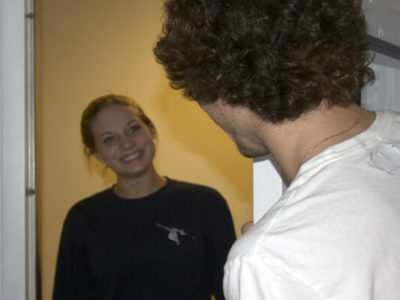In the dating world, there isn’t much that spurs anticipation and anxiety like being set up on a blind date. Awaiting a romantic rendezvous with someone you’ve never met before can posit several questions:
- Will I like this person?
- Will they like me?
- Will they be crazy?
- Will I end up embarrassing myself?
- Why did I agree to this?!
Being that blind dates involve a stranger, it may be hard to gauge what will or will not offend someone or—at the very least—kill a buzz. College Magazine has some tips and tools for blind tip etiquette. Hey, who knows? You might just have fun!
Waiting to Exhale
Take a breath! Chances are that your stomach is churning with good and bad nerves i.e. excitement at the prospect of meeting someone new as well as dread of possibly having to spend an entire evening with a person that makes Anthony Weiner look like a regular Casanova.
According to therapist and author Lisa Brookes Kift, “It’s perfectly normal to experience some worry and uncertainty when going on a blind date…The important thing is not to allow your fears to become debilitating anxiety per se where your ability to have a conversation or stay calm is impacted. Deep breathing and staying focused on the moment rather than the ‘what if’s’ are useful tools.”
Really, what’s the worst that could happen?
On second thought, don’t answer that…
Pleased to Meet You
Whenever you meet someone for the very first time, be it an employer, coworker or classmate, a certain amount of decorum is expected. The etiquette assumed when meeting a blind date is no different than the etiquette assumed when meeting any other person for the first time.
As a rule of thumb, Kift suggested that you “consider how you would like to be treated” in the situation and that “you would probably appreciate being listened to with interest and some questioning but probably not too personal too fast.”
In other words, don’t be afraid to be yourself but make sure it’s in a respectful, non-threatening way.
“I like to laugh a lot and tell jokes, and that doesn’t change when I go out on a blind date,” said Paul Gallo, a second year medical student at Temple University. “However, I always make sure to be polite and ask the girl I’m out with plenty of questions about her interests and then relate to what she talks about with my own experiences.”
Turn-taking—where there is a relatively equal exchange of talking and listening between two people—is an integral part of good conversation and etiquette.
Expect the Unexpected
Your blind date might be spectacular or it might be a disaster, or—more than likely—it will land somewhere in between great and not-so-great. So why worry about what hasn’t even happened yet? Getting your hopes up about the engagement or fretting the worst will both prove detrimental to the situation.
“Look at a blind date as an opportunity to meet another person,” suggested Kift. “If you are disappointed, still be respectful and kind. Remember this is another person just like you who probably also had some insecurities coming into the situation.”



















